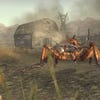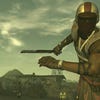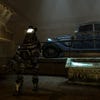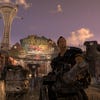Bethesda's Todd Howard
On the new game, the one after that, and ladders.
Before Eurogamer sits down with Todd Howard at QuakeCon to bully him into talking about his new game, we catch his panel with Tim Willits from id Software and Jason West and Vince Zampella from Respawn Entertainment.
It's a lot of fun and Howard's dry sense of humour is a great hangover cure. At one point, the panelists are talking about killing their babies - the idea of having to rip an idea out of their game because it's just not practically achievable - and an audience member asks them to cite examples. "Ladders," says Howard. It turns out Bethesda Game Studios isn't very good at ladders, despite multiple attempts to get them into games like Oblivion and Fallout 3.
With the panel out of the way we grill Howard about his new game (it turns out he's making two), Fallout: New Vegas, Bethesda's recent acquisitions, working with John Carmack and the company's thinking on downloadable content following lessons learned from Oblivion, and particularly Fallout 3.
[Laughs] I don't know that I could quantify it. Not that much! We spend time on it and then realise it isn't going to work again. Then we feel terrible. We feel like we're terrible game developers.
We had wanted to do a game with them. I'm only somewhat involved with them because it's done with our external group. I'm just focused on the game I'm doing. It was: hey, you guys have worked with Fallout, would you want to do something?
They asked what we thought, and we said if they wanted they could use our stuff. We did tell them that if they did, we would prefer for the franchise if they did something out west to separate the two and put your own spin on it.
Then from there they sent us the pitch - it's in Vegas, this is what it would be like. We thought it sounded great.
I think so, yeah. There are obvious similarities because it's using a lot of stuff from Fallout 3, but one of the things they really focused on is making the setting different. A place like Vegas lends itself to that.
I don't know [laughs]. I have a sense but we're not ready even to talk about that, because it might change. I don't want to disappoint people.
One thing I can say is that from when you first hear about it to when it's out will be the shortest it's been for us. It's pretty far along. When we show it, we want to show a lot, because there's a lot of game there to play right now.
You know, if Pete Hines came in and said, "I want you to show it," I'd be like, "Okay, I'm ready to show it." But we've just decided for now not to yet.
The technology is ours and it is inspired by the technology we have. We have a lot of it. But that's our starting point - the Fallout 3 tech. It started with Morrowind, we went to Oblivion, we did a lot between Oblivion and Fallout 3 because now we had final hardware - with Oblivion we had six months on final hardware, so Fallout 3 technically does a lot more than Oblivion. The new stuff is an even bigger jump from that.
I can say it is on the existing platforms, which we're really happy with. You almost feel like you have a new console when you see the game.
Well, they had been doing a game for us, and put it this way - we like it a lot. That's unannounced as well - they've been working on a game for us as a publishing deal, and we decided we should make it a permanent thing. I know the guys there - Raph [Colantonio, founder] and Harvey [Smith] - they're just very similar guys, they like similar things.





